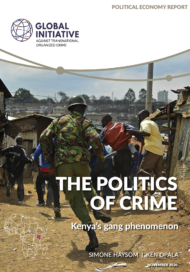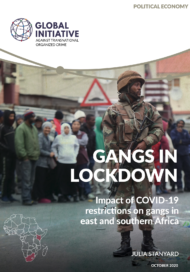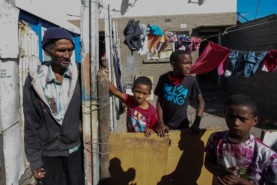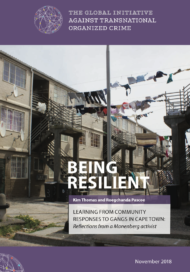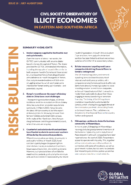Event Details
Where
Virtual event
Meeting ID: 833 8823 1107
Passcode: 809403
RSVP TO
Joyce Kimani, Observatory Coordinator for East and Horn of Africa
Joyce.Kimani@globalinitiative.net
Posted on 16 Nov 2020
Protection and patronage from politicians allow gangs to flourish – and undermine the state response to the problem. This is one of the defining characteristics of Kenya’s gang world.
Urban growth, political patronage of gangs, and the criminalization of urban municipal services are inextricably linked in many instances. This has created lucrative profit-making opportunities for gangs and other criminal groups in areas characterized by high unemployment, especially among the youth. Certain criminal gangs have become wealthy by providing informal services or taxing residents for transport, waste removal, electricity and water provision. As a result, they have become deeply embedded in the everyday lives of citizens in Nairobi and Mombasa.
The Politics of Crime traces the evolution of this criminal economy from the colonial-era through the transition to democracy, the effects of structural adjustment policies, and the formal and informal privatization of urban services as cities grew rapidly.
Join us for the launch of the flagship GI- TOC report: The Politics of Crime – Kenya’s gang phenomenon and the première of our short investigative film, Mobile Money – Inside Kenya’s Matatu Gangs. In the 1990s, organised criminal gangs began to assume prominent roles in Kenyan urban governance. Nearly 30 years later, the gang phenomenon is tied to the most pressing issues facing Kenya. A new report draws on months of fieldwork in Nairobi and Mombasa to analyse what drives and sustains this problem.
This event will discuss the report’s implications for democracy and urban development.
SPEAKERS
Simone Haysom
Senior Analyst, Global Initiative Against Transnational Organized Crime
Ken Opala
Senior Fellow, Global Initiative Against Transnational Organized Crime
Frankline Mukwanja
Executive Director of Centre for Multiparty Democracy in Kenya
This report draws on three months of fieldwork in Nairobi and Mombasa carried out between November 2019 and March 2020. Analysts from the Global Initiative Against Transnational Organized Crime (GI-TOC) conducted semi-structured interviews with a range of key informants in both cities, some of them more than once. Key informants were reached through a snowballing method, drawing on a network of illicit-economy, civil-society, and law-enforcement interviewees built up through repeated engagement on related topics in Kenya.
